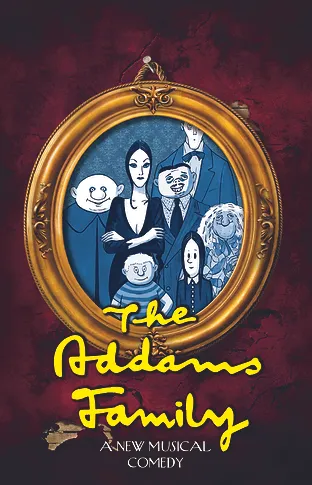
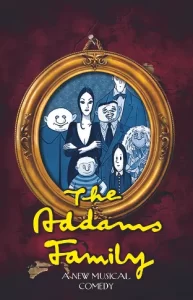 *** A wild and enthusiastic crowd greeted the cast, crew, and orchestra of the musical “The Addams Family.” Successfully reimagined from the 1960s TV series of the same name and from the 1993 movie which followed, the current production is based on Marshall Brickman and Rick Elie’s cleverly-written script, featuring music and lyrics by Andrew Lippa. This dark but cute comedy, smoothly directed by Matt Canon and presented by the relatively new Uptown Music Theater of Highland Park, is about a peculiarly unusual and eccentric family and the next episode in their family history.
*** A wild and enthusiastic crowd greeted the cast, crew, and orchestra of the musical “The Addams Family.” Successfully reimagined from the 1960s TV series of the same name and from the 1993 movie which followed, the current production is based on Marshall Brickman and Rick Elie’s cleverly-written script, featuring music and lyrics by Andrew Lippa. This dark but cute comedy, smoothly directed by Matt Canon and presented by the relatively new Uptown Music Theater of Highland Park, is about a peculiarly unusual and eccentric family and the next episode in their family history.
“The Addams Family” tells the story of Wednesday Addams (Leah Jacobson), a glum and sallow young woman* who has now grown-up and plans to marry a rather conventional man named Lucas Beineke (Justin Katin). The two of them have met earlier in Central Park, in New York City, where Wednesday was out shooting with her crossbow. Handsome by all accounts, Lucas would be considered normal in both temperament and background, as compared to Wednesday’s dourness and somewhat bizarre behavior. Not only does Lucas want to get married and raise a family, but his deepest desire is to become a medical examiner. The larger story has less to do with the fondness that Wednesday and Lucas have for each other than with what their relationship means for their parents and families. As with Romeo and Juliet, this is a story about two young people who want to get married and know that their parents will object to their decision. But what makes the show so funny is the twist of bringing together two families from very different mindsets. Every family tree has its unusual characters and its weirdnesses, and the Addams family is no different: They are just weirder than most. They live on the other side of normal…. whatever that means.
Some of the best acting and singing in the show comes from Nathaniel Vodak, who plays Wednesday’s younger brother Pugsley. Highly upset about her relationship with Lucas, he is very concerned that if they marry, “I won’t have an older sister to torture me.” Another brilliant actor and vocalist is Aaron Rumack, who plays family patriarch Gomez Addams. Throughout the performance, we see how his swordplay and fine singing voice nicely hold the story together. Then there is Morticia (Trillium Falotico), Gomez’s wife, who is alternately romantic and aloof. Gomez’s brother Uncle Fester (Michael Kirby) is also in the mix, and in this version of the story, he is portrayed as a nonbinary character, whose love is so pure in that he is in love with the moon—as compared to being in love with another human being. Then there is Grandma (Anita Silvert), who is a stitch; we see her versality and comedic side in the way she plays a ghoul, a Red Cross worker, and an old lady peddling herbal remedies. Her observations about life are classic. Rounding out the cast are Lurch, the butler (Brock Hayden), and Lucas’s parents Mal Beineke (Larry Mason) and his wife Alice (Tiffany Melvin). (I kept waiting for an appearance by Cousin It, which was not forthcoming. Maybe It was too harried on opening night to show up for the performance!) Finally, there are the Addams ancestors, who perpetuate the generations and guide the action during portions of the tale when rationality fails. The ensemble is made up of Samantha Kroening, Massimo Manfredini, Max Perkel, Betsy Pennington Taylor, Anna Widlowski, Madison Taylor Breford, Olivia Daly-Short, Abby DeRosa, Bill Gordon, Madison Jaffe-Richter, and Christopher Finch (who doubles as the props designer).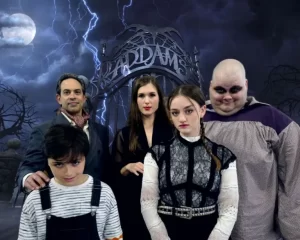
The first act is slow in spots, and some aspects could have been edited out without minimizing the plot, whereas the second act is better paced. Yet it is the excellent score and its serendipitous songs with meaningful lyrics and wonderful melodies which make up for any deficiencies in the storyline. Some of the best songs, in my opinion, include “Trapped”, “What If”, and “Just Around the Corner.” Isabella Isherwood does a first-rate job as music director; she also conducts the orchestra, made up of twelve performers. Thing, the disembodied but helpful hand who aids members of the Addams Family, also conducts the orchestra and generates energy from the audience. All this plus the joyful dancing, choreographed by Sarah Makkawy Canon, add to the lightheartedness of the story.
The set by Bob Silton is appropriate for the production, with the French-inspired fleur-de-lis pattern on the walls. Costuming by Lucy Elkin is good. Gomez is always dressed smartly. I like how Wednesday wears the crossbow on her back most of the time (with some important exceptions), and she’s always wearing boots, which is a nice touch. I felt that Lurch should have been wearing elevator shoes (or a taller person should have been cast in his role). I understand that Morticia has to move around in order to act her part on stage, but I missed her slithering in a much too tight dress that goes down to the floor as on the television show; this type of dress would have made her look like some kind of odd creature rather than fully human. However, I do understand that for her to do the tango in the second act, a shorter outfit is required—and was thus created.
Lighting design by Joel Zishuk is nicely done, especially when the use of the spotlight emphasizes a character’s thinking process, as compared to more conventional lighting being used to depict day-to-day living. While I don’t expect perfection from community theater, perhaps the biggest fault with the performance has to do with the sound: both the sound design and the sound mix. Having the orchestra off to one side of the stage can potentially make the sound uneven in the first place, but the horns and percussion occasionally overpowered the other instruments. There was also a mix problem, such that the instruments overpowered the vocals at various times when we really wanted to catch all song lyrics.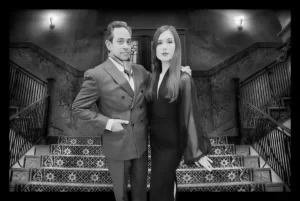
My guest told me the next day that he is still tickled by the show; he’s been laughing over it and thinking about all of the gags. “It hit right in the sweet spot,” he said. In contrast, I liked the performance very much, but I wasn’t over the moon about it. For me, the show works much better if you are already familiar with the characters from the television series or the movie “Addams Family Values.” Additionally, because the intense romance between Gomez and Morticia has not been established as powerfully as it should have been, their tango in the second act seemed to be more of a caricature than a true dance of romantic love. But perhaps my expectations were too high. I missed the intimate romance from my TV memories, when Gomez would say, “Tish, you spoke French!”, and he would subsequently kiss her up and down her arm and call her “Bubbala.” But perhaps I’m speaking to a long-gone generation by making too many (needless) comparisons with the past, when French was known as the “language of love” (and Yiddish as the “language of humor”). In fact, much of the audience had not been born at the time of the TV series or the movie, and most of the cheering was being done by children and teens who made up a good portion of the hometown crowd. Engaging past generations with familiar quips while enticing the next generation of theatergoers is how good community theater is supposed to be.
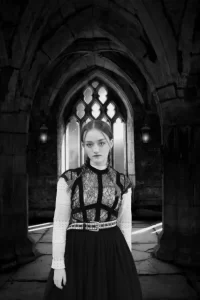 In all, this highly entertaining and fun presentation will hold the interest of those of all ages for two-and-a-half hours (including intermission). The story is dark enough to be intriguing, and light enough to be enjoyable. Just don’t expect a Broadway original—or something deep and consequential.
In all, this highly entertaining and fun presentation will hold the interest of those of all ages for two-and-a-half hours (including intermission). The story is dark enough to be intriguing, and light enough to be enjoyable. Just don’t expect a Broadway original—or something deep and consequential.
“The Addams Family” is playing for two weekends, on July 28 – 30 and August 4 – 6, 2023, at Northwood Theater, 945 North Ave., Highland Park.
Performance schedule:
Fridays – 7:30 p.m.
Saturdays – 2:00 p.m. and 7:30 p.m.
Sundays – 2:00 p.m.
Tickets are $30.
For more information and to purchase tickets, visit https://www.umthp.org/.
*Note that the character of Wednesday is based on the poem “Monday’s Child”, an Old English nursery rhyme that predicts a child’s character or future based on the day of the week they were born. It goes something like this:
“Monday’s child is fair of face, Tuesday’s child is full of grace, Wednesday’s child is full of woe, Thursday’s child has far to go, Friday’s child is loving and giving, Saturday’s child works hard for a living, And the child that is born on the Sabbath day Is bonny and blithe, and good and gay.”
To see what others are saying, visit www.theatreinchicago.com, go to Review Round-Up and click at ” The Addams Family”.






More Stories
“The Firebugs” reviewed by Julia W. Rath
“The Book of Grace” Al Bresloff with another from Paul LIsnek
“The Last Five Years” MILWAUKEE